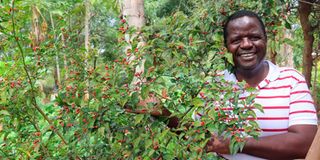Farmer relishes the fruits of agro-ecology practices

Zachary Makanya on his chilli and arrowroots farms in Marimanti, Tharaka Nithi County.
What you need to know:
- The farming technique has been lauded by the United Nations, which notes agro-ecology is helping farmers adapt to climate change.
- Indigenous people have been adapting to changes in their environments since time immemorial by developing new practices and techniques.
Marimanti, in the heart of the semi-arid Tharaka Nithi County, is so dry that even the resilient acacia trees have shed their leaves to cope.
But in Ntujia village, on the outskirts of Marimanti town, Zachary Makanya, a smallholder farmer with three acres has demonstrated that despite the scorching heat, says one can still make a living using agro-ecological farming techniques.
“Mine is a dryland agro-ecological demonstration farm, on which I invite farmers for practical lessons on how to remain food sufficient in an environment with tough climatic conditions,” says Makanya.
His farm is a mosaic of fruit trees such as pawpaws and citrus, vines, tuber crops such as cassava and arrowroots, and fresh vegetables. The farming technique has been lauded by the United Nations, which notes agro-ecology is helping farmers adapt to climate change.
The UN's Intergovernmental Panel on Climate Change (IPCC) in a recent report says ecosystem-based approaches such as diversification, land restoration, agro-ecology, and agro-forestry have the potential to strengthen resilience to climate change.
“To make things easy, I make all my inputs on the farm as a way of building socio-economic resilience,” says Makanya.
For soil health, the farmer relies on bokashi, a home-made fermented organic fertiliser, vermi tea – a liquid fertiliser collected after passing water through earthworm compost, animal and plant manure.

Zachary Makanya on his chilli and arrowroots farms in Marimanti, Tharaka Nithi County.
Edmond Totin, one of the IPCC report coordinating lead authors, notes that maize productivity has been reducing in many countries that depend on it as their staple food due to climate change.
He says there is need for diversification. “We have also highlighted the importance of using adaptation strategies that derive from indigenous knowledge,” he says.
According to the report, indigenous people have been adapting to changes in their environments since time immemorial by developing new practices and techniques.
“The relevance of such knowledge systems, which are holistic and tied to relationships between all living things, cannot be ignored at this critical time.”
Makanya says indigenous knowledge has helped him keep his farm evergreen, making stand out in the harsh Marimanti environment, which is characterised by dry shrubs and grass and the soil is directly exposed to the sun.
“I encourage farmers to use indigenous seeds, which are climate-resilient, can be replanted, and are easily available among fellow farmers,” he says.
However, to better address smallholder vulnerability to climate change impacts, the report advises that there is need for additional policy support to agro-ecology so that it is context specific.





